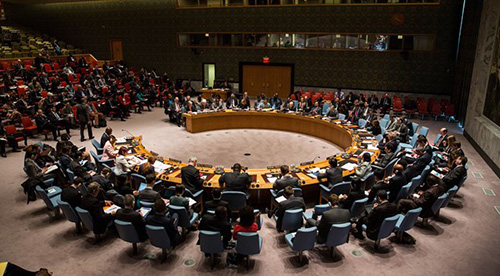Experience in Participating in UN Peacekeeping Operations of some Southeast Asian Countries
Being the biggest and most creditable organisation in the world, the United Nations (UN) has deployed its peacekeeping forces to all over the world for over 60 years. This operation is of great social and political significance and supported and participated by many countries in the world. ASEAN countries join this operation in different ways but all play their positive role.
 |
|
A meeting of the UN Security Council on peacekeeping operation (Photo: VOV) |
Among ten countries of ASEAN, Indonesia is the earliest to join the UN peacekeeping force (UNPKF). Indonesia holds their stance that the aim of joining UN peacekeeping operations (UNPKO) is to implement the UN resolution on reestablishing order, peace in areas of armed conflict. Thereby, this operation helps improving the country’s image in the international arena. However, the country only joins the UNPKO when it is suitable with the country’s basic laws and its national interests;approved by the national assembly and the president. Normally, basing on the requirements of the UN or the host country, Jakarta may deploy its military observers or joint forces. This force can carry out a number of missions, such as: cease-fire and social stabilising observation, combat training, security ensuring, humanitarian relief, election observation and safeguarding, etc.
Indonesia selects troops from its armed forces to form a specialised UN peacekeeping force. Besides being paid by the government like their peers at home, this force is also benefited from a remuneration package allowance from the UN.
Malaysia has joined the UNPKO since 1960. The country has deployed troops to 20 different countries. Its areas of participation include: military observation, liaison officer, security ensuring, patrol, military medicine and engineering. Malaysia reveals that to effectively carry out UNPKO, its force must be formed with suitable size for independent operations, put under the direct command of the representative of the UN Secretary General in the host country. If participating with small size, its force may be dispersed or merged and put under the command of a representative of another peacekeeping force, hence making it difficult for mission implementation. Malaysian experts hold that in order to fulfill their mission, along with ensuring good command, logistics, control, and communications, it is important for the country’s UNPKF to build good relationship with local people, authority and related parties in the conflict and stay neutral, unbiased.
Malaysia does not form up a specialised unit. Instead, any units in the Malaysian defence forces can be selected and dispatched. The selected unit will be trained in 3 to 6 months and won’t get any special treatment from the government.
Thai UNPKF not only operates in the framework of the UN but also joins the cooperation with other countries in the region and with its allies.
Depending on mission of the UNPKO, Thai UNPKF may join the operations such as engineering, military medicine, patrol, supervisory, and humanitarian relief, etc. but this force can engage in combat operations when needed. This force is paid by the UN and Thai government. Besides, they also get leave, healthcare, and other policies of wounded and dead soldiers in light with agreement reached by Thailand and the UN in each mission.
With the motto “no invasion”, “no endangering” and “no hostility”, when joining UNPKF, Cambodian armed forces only carry out humanitarian missions, not engaging in combat operations and they are totally free to choose areas and location of operation. To keep its credit, Cambodian government set out some compulsory rules for this force, such as: to respect sovereignty of the host country; to have good relationship with local people; not to abuse exemption do something illegal and to keep good relationship with other forces in the same mission.
To perfect and enhance their skills, Cambodian UNPKF is trained in 6 months in the Udon Mine Action Centre. They are fully paid by the UN into one of the banks in Cambodia.
By Quoc Ngoc